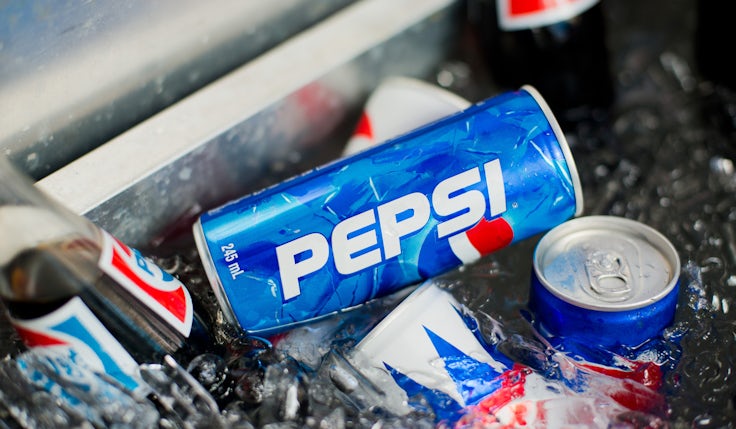PepsiCo on why sustainability initiatives don’t need to be ‘perfect’
Consumers are more receptive to sustainability initiatives when they are tied closely to a brand’s purpose, say senior marketers at PepsiCo.

PepsiCo is on a mission to drive forward sustainability initiatives which feel “authentic” to its brands and consumers, including sports partnerships which simultaneously make a positive impact on people and the planet.
Initiatives that tie into a brand’s purpose are more likely to be received well by customers, explains the FMCG giant’s vice-president of global foods marketing, Sebnem Erim.
Last week, crisp brand Lay’s (which trades as Walkers in the UK) launched the Lay’s RePlay football pitch in Turin, Italy. Recycled crisp packets make up 32% of the pitch, while the turf is 100% recyclable. The pitch, which has been set up in a community centre within the city, is the first of its kind in Italy.
The initiative began in 2015 in refugee camps in Jordan, before extending to countries including the UK and Brazil. PepsiCo says the aim is to bring access to sports to “deserving communities” and, according to Erim, the pitches have so far reached over 20,000 people directly and indirectly.
“Lay’s purpose is all about bringing joy to the world and to communities, so it fits in very nicely,” Erim says, speaking to Marketing Week.
Consumers are telling us [that] things don’t need to be perfect if you’re true to yourself and you’re taking the right steps. It’s a journey.
Sebnem Erim, PepsiCo
PepsiCo’s senior vice-president and CMO of international beverages, Mark Kirkham, adds that the company’s marketing team seeks out the initiatives that feel right for its brands.
“As marketers, we’re always looking for sponsorships and partnerships that authentically bring our brands to life,” he says.
The sustainable pitches form part of PepsiCo’s wider sustainability strategy, which falls under the ‘PepsiCo Positive’ (‘pep+’) platform. This involves an “end-to-end transformation” of the business, with the goal of putting sustainability at the centre of all it does.
The platform is also about making a positive contribution both to the planet and people, Erim explains. The recycled pitches are a “beautiful example of both”.
“We’re bringing joy to the community, bringing them together, but also giving second life to our [crisp] bags,” she says.
“Authentic” initiatives like this are more likely to be appreciated by consumers, who increasingly want to see companies take positive action on the environment, she adds.
While many brands have come up against allegations of “greenwashing” with their sustainability projects, Erim says PepsiCo takes a “very transparent” approach that consumers appreciate. The business utilises insights from channels such as social media to keep on top of what consumers want to see.
Innocent calls on industry to join forces to avoid ‘greenwashing’
“Consumers are telling us [that] things don’t need to be perfect if you’re true to yourself and you’re taking the right steps. It’s a journey,” she says.
Erim adds that consumers are looking to brands to help them make more sustainable choices. PepsiCo, as one of the world’s largest food and drink businesses, can provide such a “platform”, she says.
The “very clichéd” marketing of the past doesn’t appeal to younger Gen Z consumers, she adds, so marketers need to look for different ways to present their products by encouraging these “positive choices”.
“That doesn’t mean you won’t have products that are great tasting,” she says.
“But sustainability should be at the very forefront and should be included from the beginning of the [brand’s] journey. That’s how we work as a marketing team now, [by including] all the cross functional teams from the start.”
Future proofing its brands
So far, consumer reaction to PepsiCo’s pep+ platform has been “phenomenal”, Erim says.
As well as being a hit with consumers, initiatives like reducing the amount of salt in products or choosing healthier oils are also helping to “future proof” PepsiCo’s portfolio, she explains, adding that the business has “hard measures” that it adheres to on these goals. For example, in the UK Walkers has set itself a target of making 50% of its sales from snacks that are non-HFSS or under 100 calories by 2025.
Meanwhile, as part of the platform PepsiCo is working to champion equality in sport, with women’s football a particular focus. The company is a sponsor of the UEFA Women’s Champions League, the final of which took place in Turin over the weekend.
The new pitch was also put to use when it played host to another of PepsiCo’s sponsorship initiatives, the Gatorade 5v5 Tournament national finals. The tournament is an annual five-a-side competition for 14 to 16-year-olds, and this year’s was the first-ever all female tournament in the history of the competition, tied to the UEFA Women’s Champions League.
It’s not just about marketing. We all have a role in helping to build the brands and bring the pep+ story to life.
Mark Kirkham, PepsiCo
However, it is important for the business to not support equality in sport in a tokenistic way, Erim notes.
“What we don’t want is a spike during the Champions League finals and [to then] forget about this for the rest of the calendar year,” she says.
Meanwhile, Kirkham explains how such initiatives can have material benefits for PepsiCo’s brands.
“If you think about every person who’s on this programme, they have a positive experience with the brand and then they can actually become loyal customers. But I think more importantly, they become loyal to what we’re trying to do,” he says.
As an end-to-end programme, Kirkham claims people in every part of the business, from truck drivers to senior executives, are sold on the benefits that pep+ and its initiatives will bring to the company.
“It’s not just about marketing. We all have a role in helping to build the brands and bring the pep+ story to life,” he says.








Comments